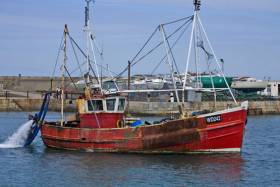Displaying items by tag: Climate Change Adaptation Plan
Marine Minister Michael Creed yesterday (Thursday 27 June) helped launch the public consultation process on the draft Climate Change Adaptation Plan for the agriculture, forest and seafood sectors.
“I am very pleased to launch this public consultation on adaptation planning,” said Minister Creed. “We have very much taken a joined-up approach to adaptation planning across the Department [of Agriculture, Food and the Marine] and have prepared a single plan covering the agriculture, forest and seafood sector.”
He added that in addition to reducing our emissions, “we need to ensure that our food production system is resilient and ready to adapt to future climate risk.
“Farmers, landowners and fishermen are very much to the forefront of dealing with the impacts of a changing climate in their everyday activities. However, climate change is not just an issue for the primary producer; it is something that everyone in the production chain needs to consider.
“The Irish agriculture, forest and seafood sector will not only be impacted by changes in climate here at home, but also by climate change globally.”
Andrew Doyle, Minister of State for food, forestry and horticulture, said the plan is “a next step in climate action planning. To successfully deal with the challenges facing us, we need to work together to make the right choices. While there will be challenges, there will also be opportunities.”
The draft Climate Change Adaptation Plan highlights a number of case studies identifying how the sector has and will continue to be impacted by changing weather patterns, and steps towards building resilience.
Feedback on the draft plan and suggestions as to how the department and the sector itself can best prepare to operate in a changing climate should be forwarded before the closing date of Friday 16 August.
Speaking ahead of the Our Ocean Wealth Summit in Cork earlier this month, Tánaiste Simon Coveney said the State is particularly aware of the threat posed by climate change to this island nation.
The subsequently launched Climate Action Plan from the Department of Communications, Climate Action and the Environment has been welcomed in many quarters, but has also been criticised for showing “little ambition”.




























































